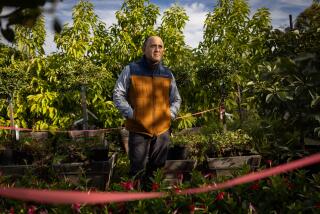Fruit Flies Die Before Finishing Shuttle Mission : Space: Sterilizing solution left in container by accident kills more than half of them. They were to be used in weightlessness study.
- Share via
KENNEDY SPACE CENTER, Fla. — Discovery’s astronauts endured some nauseating spins in a rotating chair Saturday, then took time out to lament the untimely deaths of hundreds of fruit flies used in a weightlessness experiment.
Scientists said more than half of the 480 flies aboard the space shuttle were killed by sterilizing chemicals accidentally left on the insect containers. A similar number of flies in a control group on Earth also died.
“It’s a disappointment for everybody. We would have preferred to have flying flies,” said the European Space Agency’s Claude Brillouet, a project scientist.
“These little flies are very sensitive to this sort of thing,” said NASA mission scientist Robert Snyder.
Snyder expected few, if any, of the flies to survive the seven-day mission, even though some of the trays might not have as much sterilizing solution on them as others. “I don’t give them much of a chance,” he said.
Before they died, some of the flies laid eggs that will be studied after the laboratory research mission, Snyder added.
The flies constituted the only major casualties since Discovery blasted off Wednesday with 72 million roundworms, 3,942 stick insects, slime mold, fetal mouse bones, lentil roots, yeast, bacteria, oat and wheat seedlings, hamster kidney cells and human blood cells.
Researchers from the University of Madrid in Spain wanted to see how the flies develop in weightlessness.
Fly embryos flown on previous shuttle missions have developed genetic defects, evidently due to space radiation. Previous studies also have shown that female flies live longer in space than male flies.
Saturday turned out to be a bad day for astronaut David C. Hilmers. Not only did he find the dead flies, he was forced to take several spins in a rotating chair for a space motion sickness study.
“I’d feel better if they could turn off the rotator switch,” Hilmers said at one point.
Moments later he said: “Well, it nailed me. We’re OK, though.”
Fellow astronaut Ulf D. Merbold, a German physicist, also took a spin.
NASA would not say whether the astronauts actually became ill during the experiment. Although the rotating chair is not intended to make astronauts nauseated, doctors acknowledge it probably would, especially early in flight.
Most astronauts become sick and light-headed upon reaching orbit and need several days to adjust to weightlessness.
NASA repeatedly has said the crew of six men and one woman is doing well despite repeated rides in the rotating chair and a sled that lurches back and forth on tracks.
Discovery is scheduled to land Wednesday at Edwards Air Force Base in California.




